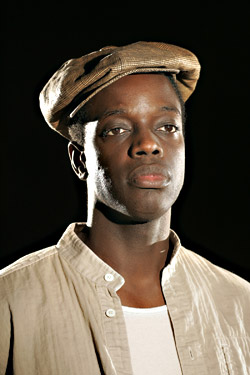Bigger Thomas, the doomed protagonist of Richard Wright’s haunting novel Native Son, is one of the great antiheroes of 20th-century literature, a tangled, tragic figure in the existentialist tradition of Dostoyevsky’s Raskolnikov and Camus’ Stranger. Born into poverty, criminality, and self-loathing, paralyzed by an awareness that his skin marks him for ultimate failure, Bigger stands exposed, a human measure of the terrifying cost of race relations in an American society founded on the bad blood of slavery. Bigger is race. He is the history of racial injustice, the alpha and omega of a nation’s crime and its punishment. Bigger is all that, and this, too: a manchild and a murderer.
Intiman’s production of Native Son, adapted from a script by Wright and Paul Green and directed by Kent Gash, opens with a breathtaking image: Out of the darkness emerges actor Ato Essandoh in the lead role, his bare body bathed in an eerie, shimmering light. Frozen in a Jesus pose, he stares brazenly into the ether, defying the audience to behold his complete exposure. It is not Essandoh’s nudity but his nakedness that is so stunning—the black man’s objectified body opened for all to read, a symbol and a cipher. Across the floor on which Essandoh stands flies the silhouette of a plane, its propellers buzzing. It is only a reflection, a rumor of freedom, as well as an insult to Bigger’s dreams of flight.
The production moves at a breakneck speed. Bigger’s story—centered on his accidental murder of the debauched, idealistic daughter of a piously liberal couple who hire him as their driver—is stripped to its bare elements, moving from “Fear” to “Flight” to “Fate” with the relentless certainty of a death foretold. Where Wright’s novel was gritty, insular, and deliberate, the play is heavily symbolic and at times laden with a kind of postmodern artifice: Devices such as mock-newsreel narration and characters who directly address the audience are used to swallow large chunks of the novel (mostly effective, save for a third-act soliloquy by Bigger’s lawyer Max that proves ponderous in relation to the rest of the action). The language is sharp, melodic, and occasionally shockingly harsh. Gash does a keen job orchestrating these elements and gives the production a consistent atmosphere of brooding dread, eased at moments by bursts of streetwise humor and by the fine musical accompaniment of guitarist/composer Chic Street Man. Edward E. Haynes Jr.’s spare, spacious set, a thumbnail sketch of 1930s Chicago, is lovely and well utilized, peopled by a strong cast who dig into the material with verve and dedication.
As Bigger, Essandoh is a revelation. He embodies the character in all his hellish complexity: the haughty swagger that walks a fault line of fear, the maniac rage, the absurd hilarity of Bigger’s fate. It is an awesome performance, as riveting as can be and utterly in tune with the mad, jazzy march of Wright’s narrative. There is a scene midplay in which Bigger, overcome by the ugly comedy of his plight, is caught up by a fit of laughter that quickly degenerates into an insane cackle, punctuated by terrible pronouncements. Essandoh plays the moment with uncommon intensity, his body racked by such a seizure of chaotic emotion he appears possessed by demons. His eyes contain a terrible knowledge. Essandoh closes the play as he begins it, stripped naked, his limbs outspread in a display of aggressive innocence. But this time, the gesture is preparatory to a baptism of fire—he turns and walks into the fire backstage, his figure licked by the flames of judgment. As Bigger says, “They wouldn’t let me live.” So they let him burn.
Native Son Intiman Theatre, 201 Mercer St., Seattle Center, 206-269-1900, www.intiman.org. Various times and days. Through Nov. 19.








